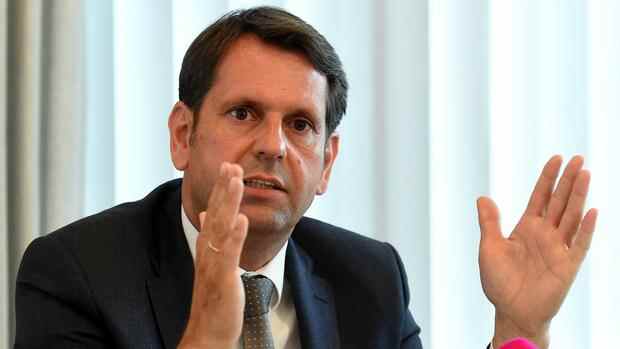Lies told the Handelsblatt that the state had to alleviate the enormous burden on citizens. This is particularly true for low-income households. The federal government has corrected the growth forecast for 2022 downwards. At the same time, prices are rising, and energy in particular is becoming more and more expensive. “I’m afraid the price development will be dramatic for the citizens,” said Lies.
Lies sees the energy money now passed by the federal government as a step in the right direction. “But: The sum will not be enough because private households are already being hit by price increases, which are an extreme burden for many,” emphasized the SPD politician. “We will have to readjust and mobilize additional money for support.” He therefore assumes that “another relief package will have to be launched”.
The federal cabinet decided on a second relief package for citizens on Wednesday. Among other things, the energy tax on fuel is to be reduced for a limited period of three months. Employed persons who are subject to income tax are to receive a one-time gross energy benefit of EUR 300 to compensate for the high energy costs.
Top jobs of the day
Find the best jobs now and
be notified by email.
The inflation rate in Germany rose further to 7.4 percent in April due to the war in Ukraine and rising energy prices. This is the highest level since October 1981, as reported by the Federal Statistical Office.
Gas lock warning
Dörte Elss from the Berlin consumer advice center reports that a large number of concerned citizens called because they were afraid of a gas blockage because of unpaid bills. It’s not just about socially disadvantaged people, Elss told the RBB broadcaster. “Groups are also affected that have not previously needed social benefits.”
The Federation of German Consumer Organizations (VZBV) is therefore calling for electricity and gas cuts to be suspended. The head of the energy and construction team at VZBV, Thomas Engelke, told the Handelsblatt that the federal government must ensure when reforming the Energy Security Act “that heat and heating should not be a question of money”.
“Households must be supplied with energy in the event of insolvency,” Engelke demanded. A “moratorium” on gas or electricity cuts for consumers who cannot pay their bills must therefore be stipulated in the law.
In view of the tense situation, the Union and the Greens also doubt that the relief that has been decided will be sufficient. It is disputed, however, whether there must be a third relief package. “The end of the road may not have been reached with the two relief packages,” said Green social expert Frank Bsirske.
Saxony’s energy and climate protection minister Wolfram Günther (Greens), on the other hand, rejected a third relief package as “pure actionism”. “We first have to get the second relief package through the parliamentary procedure and wait for its effect,” Günther told the Handelsblatt.
The deputy CDU chairman Andreas Jung called for a general rethinking in the discharge debate. “We don’t always need new packages, but finally a convincing concept,” Jung told the Handelsblatt. With “a lot of noise”, the coalition launched a second relief package, although not a single euro from the first package had reached the people.
Jung called for a “relief of taxes and duties” instead of measures for individual population groups. “Measures that are structurally necessary anyway are a priority, such as reducing the electricity tax to the European minimum,” demanded Jung.
Union develops energy policy strategy paper
The demand would also meet the German economy. Germany has so far been at the top of the European comparison when it comes to energy taxes. Therefore, the government must reduce the electricity tax from the current 20.50 euros to the EU minimum level of 0.54 euros per megawatt hour for commercial use, said Joachim Lang, general manager of the Federation of German Industries (BDI), recently the “Wirtschaftswoche”.
The Secretary General of the CSU, Stephan Mayer, went even further. The federal government should work at European level to ensure that the minimum tax rate permitted under Union law is also abolished. “We should reduce the energy and sales tax on energy as much as possible,” he said.
The presidiums of the CDU and CSU are meeting in Cologne this Monday. Originally, both parties wanted to adopt a joint energy concept there. As it was said, given the tense situation surrounding the Ukraine war, there will now be a security policy resolution instead of an energy policy strategy paper as originally planned.
CDU Vice Jung emphasized that the Union was in favor of a “temporary reduction in VAT on energy”. “Since the VAT is levied on the current price plus energy tax, the state has significant additional income from the increased prices.”
According to the ideas of the CDU, the socially disadvantaged are to be supported by means of a “dynamic flat rate for heating costs”. Jung suggested extending the income limits. “It should also support people who earn a little more than recipients of housing benefit. They, too, have been hit hard by the increased prices.”
Saxony’s Energy Minister Günther warned that all relief should be targeted and have a steering effect. “I doubt that a tank discount that also benefits the rich is accurate and has the right steering effect if we also have to get rid of Russian oil,” said the Green politician.
More: Up to 890 euros less taxes: That’s how much savings the federal government’s relief packages bring.
